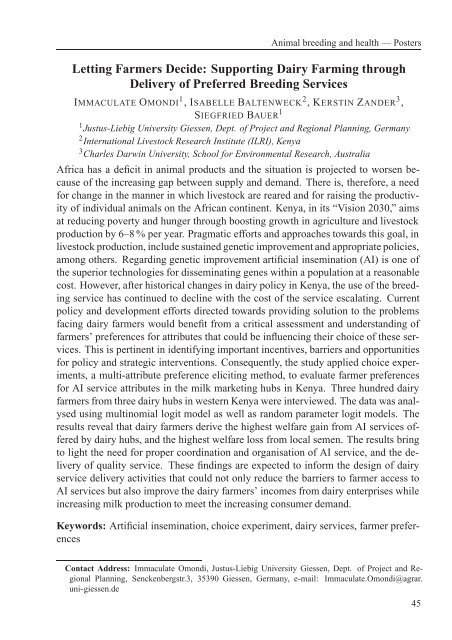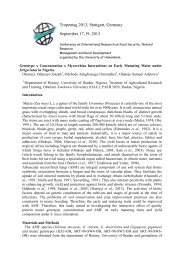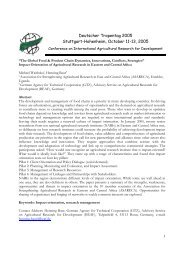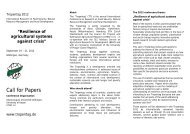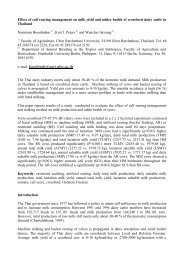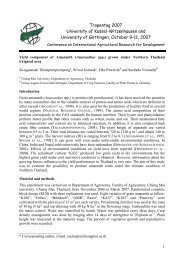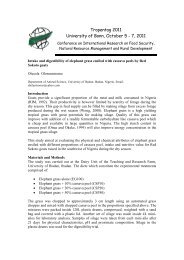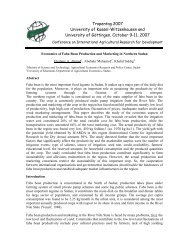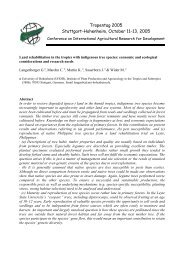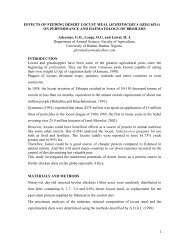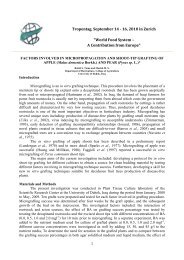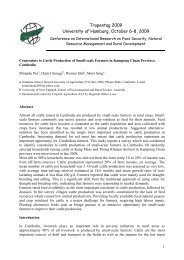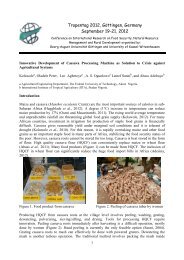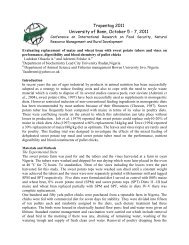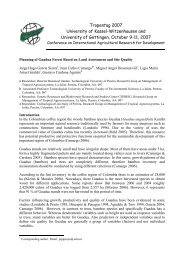- Page 1 and 2: Tropentag 2012 International Resear
- Page 3 and 4: Preface The annual TROPENTAG, the l
- Page 5 and 6: Message Almost one billion people w
- Page 7 and 8: Contents Plenary speeches 9 I Anima
- Page 9 and 10: Plenary speeches ACHIM DOBERMANN: L
- Page 11 and 12: Plenary speeches Soils and Resilien
- Page 13: Animals 1) Pastoralism and rangelan
- Page 16 and 17: Animals 16 LENA RATHJEN, JAN PFISTE
- Page 18 and 19: Animals Strengthening Resilience of
- Page 20 and 21: Animals Nomadic Pastoralism in Sout
- Page 22 and 23: Animals Responses of Communities Pl
- Page 24 and 25: Animals Can an Improved Dual Purpos
- Page 26 and 27: Animals Mammalian Herbivores as Des
- Page 28 and 29: Animals Cattle and Sheep Foraging B
- Page 30 and 31: Animals Effects of Alternating vers
- Page 32 and 33: Animals Influence of Plantation Spe
- Page 34 and 35: Animals NIRS Prediction of Neutral
- Page 36 and 37: Animals Rangelands Ecosystems of th
- Page 38 and 39: Animals 38 EVANS D. ILATSIA, ALICE
- Page 40 and 41: Animals The Origin of the ‘Mycopl
- Page 42 and 43: Animals Genetic and Economic Evalua
- Page 46 and 47: Animals Genetic Similarity and Envi
- Page 48 and 49: Animals Phenotypic Characterisation
- Page 50 and 51: Animals Body Measurements and Body
- Page 52 and 53: Animals Livestock Genetic Resources
- Page 54 and 55: Animals Causes of Condemnations of
- Page 56 and 57: Animals Livestock Bio-diversity vis
- Page 58 and 59: Animals 58 MARTINS ANDOR ISIKA, FRE
- Page 60 and 61: Animals Nutritional Value of Canava
- Page 62 and 63: Animals Cost Effectiveness of Feedi
- Page 64 and 65: Animals Feeding Fish Without Fishme
- Page 66 and 67: Animals Effect of Dietary Levels of
- Page 68 and 69: Animals Effects of Soyabean Oil and
- Page 70 and 71: Animals Modelling Heat Stress Chara
- Page 72 and 73: Animals Performance, Digestibility
- Page 74 and 75: Animals A Comparative Study of two
- Page 76 and 77: Animals Effect of Oil Bean Meal Die
- Page 78 and 79: Animals Management Strategies Emplo
- Page 80 and 81: Animals Evaluation of Growth Indice
- Page 82 and 83: Animals The Welfare of Working Hors
- Page 85 and 86: Ruminant husbandry systems Posters
- Page 87 and 88: Ruminant husbandry systems — Post
- Page 89 and 90: Ruminant husbandry systems — Post
- Page 91 and 92: Ruminant husbandry systems — Post
- Page 93 and 94: Ruminant husbandry systems — Post
- Page 95 and 96:
Ruminant husbandry systems — Post
- Page 97 and 98:
Ruminant husbandry systems — Post
- Page 99 and 100:
Ruminant husbandry systems — Post
- Page 101:
Plants and Soils 1) Cropping system
- Page 104 and 105:
Plants and Soils 104 CHRISTOPH GEHR
- Page 106 and 107:
Plants and Soils 106 ELFADIL BASHIR
- Page 108 and 109:
Plants and Soils Historic and Futur
- Page 110 and 111:
Plants and Soils Effect of Marker-A
- Page 112 and 113:
Plants and Soils Impact of Irrigati
- Page 114 and 115:
Plants and Soils Medicinal Herbs Cu
- Page 116 and 117:
Plants and Soils Characterisation o
- Page 118 and 119:
Plants and Soils The Patterns of Po
- Page 120 and 121:
Plants and Soils Enhancing Germinat
- Page 122 and 123:
Plants and Soils Evaluation of Hydr
- Page 124 and 125:
Plants and Soils Pollination Servic
- Page 126 and 127:
Plants and Soils Potential of Crota
- Page 128 and 129:
Plants and Soils Differential Expre
- Page 130 and 131:
Plants and Soils Development of Ins
- Page 132 and 133:
Plants and Soils Management of Fung
- Page 134 and 135:
Plants and Soils Effectiveness of R
- Page 136 and 137:
Plants and Soils Establishment and
- Page 138 and 139:
Plants and Soils Foliar Application
- Page 140 and 141:
Plants and Soils Effects of Late Se
- Page 142 and 143:
Plants and Soils The Effect of Envi
- Page 145 and 146:
Crop biotic stresses (DPG session)
- Page 147 and 148:
Crop biotic stresses (DPG session)
- Page 149 and 150:
Crop biotic stresses (DPG session)
- Page 151 and 152:
Crop biotic stresses (DPG session)
- Page 153 and 154:
Crop biotic stresses (DPG session)
- Page 155 and 156:
Crop biotic stresses (DPG session)
- Page 157 and 158:
Crop biotic stresses (DPG session)
- Page 159 and 160:
Crop biotic stresses (DPG session)
- Page 161 and 162:
Crop biotic stresses (DPG session)
- Page 163 and 164:
Crop biotic stresses (DPG session)
- Page 165 and 166:
Crop biotic stresses (DPG session)
- Page 167 and 168:
Crop biotic stresses (DPG session)
- Page 169 and 170:
Crop biotic stresses (DPG session)
- Page 171:
Crop biotic stresses (DPG session)
- Page 174 and 175:
Plants and Soils 174 NGOME AJEBESON
- Page 176 and 177:
Plants and Soils In-field Rainwater
- Page 178 and 179:
Plants and Soils This is likely exp
- Page 180 and 181:
Plants and Soils Resilience of Orga
- Page 182 and 183:
Plants and Soils Impact of Mixed an
- Page 184 and 185:
Plants and Soils Improvement of San
- Page 186 and 187:
Plants and Soils Optimisation of Ro
- Page 188 and 189:
Plants and Soils A Typology of the
- Page 190 and 191:
Plants and Soils Cultivation on Pol
- Page 192 and 193:
Plants and Soils The Contribution o
- Page 194 and 195:
Plants and Soils Conservation Agric
- Page 196 and 197:
Plants and Soils Viability of Soil
- Page 198 and 199:
Plants and Soils Legume Small GTPas
- Page 200 and 201:
Plants and Soils Regeneration of Vi
- Page 202 and 203:
Plants and Soils Microbial Biomass
- Page 204 and 205:
Plants and Soils 204 EASTONCE GWATA
- Page 206 and 207:
Plants and Soils Triticum aestivum
- Page 208 and 209:
Plants and Soils Season of Burning
- Page 210 and 211:
Plants and Soils Nutrient Depositio
- Page 212 and 213:
Plants and Soils Pattern of Nitroge
- Page 214 and 215:
Plants and Soils An Assessment of S
- Page 216 and 217:
Plants and Soils Fate of Fertiliser
- Page 218 and 219:
Plants and Soils Translocation and
- Page 220 and 221:
Plants and Soils 220 MOHSEN JAHAN,
- Page 222 and 223:
Plants and Soils 222 LI JIANG, JIXU
- Page 224 and 225:
Plants and Soils Homegardens in Sud
- Page 226 and 227:
Plants and Soils The Dynamic Role o
- Page 228 and 229:
Plants and Soils Effects of Activat
- Page 230 and 231:
Plants and Soils Economic Viability
- Page 232 and 233:
Plants and Soils Radiation Absorpti
- Page 234 and 235:
Plants and Soils The Influence of H
- Page 236 and 237:
Plants and Soils Effects of Activat
- Page 238 and 239:
Plants and Soils The Challenges of
- Page 240 and 241:
Plants and Soils Methane and Nitrou
- Page 242 and 243:
Plants and Soils Plant Genetic Reso
- Page 244 and 245:
Plants and Soils Importance of Flyi
- Page 246 and 247:
Plants and Soils Improving Peri-Urb
- Page 248 and 249:
Plants and Soils Participatory Cott
- Page 250 and 251:
Plants and Soils Organic Management
- Page 252 and 253:
Plants and Soils Linking Indigenous
- Page 254 and 255:
Plants and Soils Knowledge and Usag
- Page 256 and 257:
Plants and Soils Genetic Variabilit
- Page 258 and 259:
Plants and Soils Effects of Geohumu
- Page 260 and 261:
Plants and Soils Ethnoecological An
- Page 262 and 263:
Plants and Soils Investigation of W
- Page 265 and 266:
Forestry Oral Presentations 269 ISM
- Page 267 and 268:
Forestry — Contents DUC LE, WALTE
- Page 269 and 270:
Forestry — Oral Presentations Acc
- Page 271 and 272:
Forestry — Oral Presentations Ben
- Page 273 and 274:
Forestry — Oral Presentations Tre
- Page 275 and 276:
Forestry — Posters Farmers’ Dec
- Page 277 and 278:
Forestry — Posters Adapting Lands
- Page 279 and 280:
Forestry — Posters Conservation a
- Page 281 and 282:
Forestry — Posters Demographic St
- Page 283 and 284:
Forestry — Posters Livelihoods Su
- Page 285 and 286:
Forestry — Posters Assessing the
- Page 287 and 288:
Forestry — Posters Seasonal Chang
- Page 289 and 290:
Forestry — Posters Fine Root Biom
- Page 291 and 292:
Forestry — Posters Implementation
- Page 293 and 294:
Forestry — Posters Smallholder Tr
- Page 295 and 296:
Forestry — Posters Effects of Lan
- Page 297 and 298:
Forestry — Posters Reconstructing
- Page 299 and 300:
Forestry — Posters Floristic Comp
- Page 301 and 302:
Forestry — Posters Enhancing Cost
- Page 303 and 304:
Agroforestry Invited Paper 305 EDUA
- Page 305 and 306:
Agroforestry — Invited Paper Shad
- Page 307 and 308:
Agroforestry — Oral Presentations
- Page 309 and 310:
Agroforestry — Oral Presentations
- Page 311 and 312:
Agroforestry — Posters Genetic Di
- Page 313 and 314:
Agroforestry for Resilient Agroecos
- Page 315 and 316:
Agroforestry — Posters Quesungual
- Page 317 and 318:
Agroforestry — Posters Making Soc
- Page 319 and 320:
Agroforestry — Posters Tree Diver
- Page 321 and 322:
Agroforestry — Posters Assessing
- Page 323:
Socioeconomics 1) High-value market
- Page 326 and 327:
Socioeconomics 326 ANNE ULRICH: Par
- Page 328 and 329:
Socioeconomics Can Contract Farming
- Page 330 and 331:
Socioeconomics Welfare Effects of C
- Page 332 and 333:
Socioeconomics Importance of Mobile
- Page 334 and 335:
Socioeconomics Multi-Layer Distribu
- Page 336 and 337:
Socioeconomics Participation of Sma
- Page 338 and 339:
Socioeconomics Fair Trade and Organ
- Page 340 and 341:
Socioeconomics Environmental and Qu
- Page 342 and 343:
Socioeconomics Impact of Certificat
- Page 344 and 345:
Socioeconomics The Role of Collecti
- Page 346 and 347:
Socioeconomics 346 JACKSON LANGAT,
- Page 348 and 349:
Socioeconomics Cultivar Selection f
- Page 350 and 351:
Socioeconomics Farm Size and Produc
- Page 352 and 353:
Socioeconomics What Happened to Bt
- Page 354 and 355:
Socioeconomics A Qualitative Approa
- Page 356 and 357:
Socioeconomics Constraints to Integ
- Page 358 and 359:
Socioeconomics Determinants of Irri
- Page 360 and 361:
Socioeconomics Crop Production and
- Page 362 and 363:
Socioeconomics Driving Factors of L
- Page 364 and 365:
Socioeconomics Productivity and Tec
- Page 366 and 367:
Socioeconomics Efficiency Analysis
- Page 368 and 369:
Socioeconomics Adapting or Coping?
- Page 370 and 371:
Socioeconomics Environmental Effici
- Page 372 and 373:
Socioeconomics Bridging the Researc
- Page 374 and 375:
Socioeconomics Factors Affecting th
- Page 376 and 377:
Socioeconomics Changes in Tradition
- Page 379 and 380:
Rural development Oral Presentation
- Page 381 and 382:
Rural development — Contents JAEN
- Page 383 and 384:
Rural development — Oral Presenta
- Page 385 and 386:
Rural development — Oral Presenta
- Page 387 and 388:
Rural development — Oral Presenta
- Page 389 and 390:
Rural development — Posters Analy
- Page 391 and 392:
Rural development — Posters Asses
- Page 393 and 394:
Rural development — Posters Value
- Page 395 and 396:
Rural development — Posters Typic
- Page 397 and 398:
Rural development — Posters Deter
- Page 399 and 400:
Rural development — Posters Analy
- Page 401 and 402:
Rural development — Posters Finan
- Page 403 and 404:
Rural development — Posters The R
- Page 405:
Rural development — Posters Livel
- Page 408 and 409:
Socioeconomics 408 ANN WATERS-BAYER
- Page 410 and 411:
Socioeconomics Assessing Sustainabl
- Page 412 and 413:
Socioeconomics Participatory Monito
- Page 414 and 415:
Socioeconomics • Need assessment
- Page 416 and 417:
Socioeconomics Assessing the Impact
- Page 418 and 419:
Socioeconomics Strengthening Local
- Page 420 and 421:
Socioeconomics Innovative Approache
- Page 422 and 423:
Socioeconomics The Impact of Religi
- Page 424 and 425:
Socioeconomics The Right to Adequat
- Page 427 and 428:
Food security and adaptation Poster
- Page 429 and 430:
Food security and adaptation — Po
- Page 431 and 432:
Food security and adaptation — Po
- Page 433 and 434:
Food security and adaptation — Po
- Page 435 and 436:
Food security and adaptation — Po
- Page 437 and 438:
Food security and adaptation — Po
- Page 439 and 440:
Food security and adaptation — Po
- Page 441 and 442:
Food security and adaptation — Po
- Page 443 and 444:
Food security and adaptation — Po
- Page 445 and 446:
Food security and adaptation — Po
- Page 447:
Food security and adaptation — Po
- Page 451 and 452:
Innovations in agricultural enginee
- Page 453 and 454:
Innovations in agricultural enginee
- Page 455 and 456:
Innovations in agricultural enginee
- Page 457:
Innovations in agricultural enginee
- Page 460 and 461:
Engineering Water Spreading Weirs:
- Page 462 and 463:
Engineering Sustainable Agriculture
- Page 464 and 465:
Engineering Study on Driving Factor
- Page 466 and 467:
Engineering Subsurface Irrigation b
- Page 468 and 469:
Engineering Development of LPG and
- Page 471 and 472:
Post-harvest technology Posters 473
- Page 473 and 474:
Post-harvest technology — Posters
- Page 475 and 476:
Post-harvest technology — Posters
- Page 477 and 478:
Post-harvest technology — Posters
- Page 479 and 480:
Post-harvest technology — Posters
- Page 481 and 482:
Post-harvest technology — Posters
- Page 483 and 484:
Post-harvest technology — Posters
- Page 485 and 486:
Post-harvest technology — Posters
- Page 487 and 488:
Food, health and nutrition Posters
- Page 489 and 490:
Food, health and nutrition — Post
- Page 491 and 492:
Food, health and nutrition — Post
- Page 493 and 494:
Food, health and nutrition — Post
- Page 495 and 496:
Food, health and nutrition — Post
- Page 497 and 498:
Food, health and nutrition — Post
- Page 499:
Food, health and nutrition — Post
- Page 503 and 504:
Systems modelling Invited Paper 507
- Page 505 and 506:
Systems modelling — Contents EIKE
- Page 507 and 508:
Systems modelling — Invited Paper
- Page 509 and 510:
Systems modelling — Oral Presenta
- Page 511 and 512:
Systems modelling — Oral Presenta
- Page 513 and 514:
Systems modelling — Posters Model
- Page 515 and 516:
Systems modelling — Posters Clima
- Page 517 and 518:
Systems modelling — Posters Diffe
- Page 519 and 520:
Systems modelling — Posters Model
- Page 521 and 522:
Systems modelling — Posters Susta
- Page 523 and 524:
Systems modelling — Posters Spati
- Page 525 and 526:
Systems modelling — Posters Can S
- Page 527 and 528:
Systems modelling — Posters Quant
- Page 529 and 530:
Systems modelling — Posters Chall
- Page 531 and 532:
Systems modelling — Posters Asses
- Page 533 and 534:
Systems modelling — Posters Resil
- Page 535 and 536:
Systems modelling — Posters Agric
- Page 537 and 538:
Systems modelling — Posters Poten
- Page 539 and 540:
Systems modelling — Posters Multi
- Page 541 and 542:
Systems modelling — Posters Under
- Page 543:
Development Cooperation 1) Soils an
- Page 546 and 547:
Development Cooperation 546 LULSEGE
- Page 548 and 549:
Development Cooperation were assess
- Page 550 and 551:
Development Cooperation Ecosystem S
- Page 552 and 553:
Development Cooperation Understandi
- Page 554 and 555:
Development Cooperation Analysis of
- Page 556 and 557:
Development Cooperation The Approac
- Page 558 and 559:
Development Cooperation A Knowledge
- Page 560 and 561:
Development Cooperation Resilience
- Page 562 and 563:
Tropentag 2012 — Universities of
- Page 564 and 565:
Tropentag 2012 — Universities of
- Page 566 and 567:
Tropentag 2012 — Universities of
- Page 568 and 569:
Tropentag 2012 — Universities of
- Page 570 and 571:
Tropentag 2012 — Universities of
- Page 572 and 573:
Tropentag 2012 — Universities of
- Page 574 and 575:
Tropentag 2012 — Universities of
- Page 576 and 577:
Tropentag 2012 — Universities of
- Page 578 and 579:
Tropentag 2012 — Universities of
- Page 580 and 581:
Tropentag 2012 — Universities of
- Page 582 and 583:
Tropentag 2012 — Universities of
- Page 584 and 585:
Tropentag 2012 — Universities of
- Page 586:
Tropentag 2012 — Universities of


